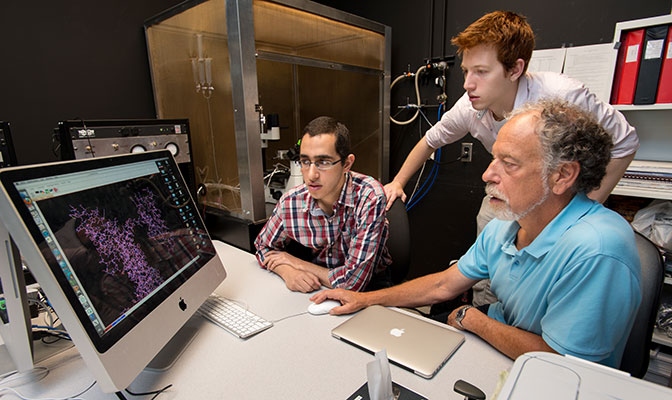Tuesday, August 18, 2015
by Simon Fraser University Communications Office
BURNABY, B.C. - Scientists, including SFU professor Peter Ruben, have found that sudden death caused by cardiac arrhythmia can be triggered by changes in body temperature. The study is published in the Journal of Physiology.
The soccer player who drops dead in the middle of a game, or the infant who dies during sleep is often a victim of arrhythmia. Sudden cardiac death has several causes, including inheritable mutations in our DNA affecting structure and function of proteins in the heart. Simon Fraser University professor Peter Ruben found when studying the proteins that underlie electrical signaling in the heart, and subjecting those proteins to conditions that are similar to the stress of exercise, in some cases, temperature can cause changes that trigger arrhythmia.
According to Ruben, a professor in the Department of Biomedical Physiology and Kinesiology (BPK) and the university's faculty athletics representative, when muscle cells in our hearts contract rhythmically and in a well-coordinated way, the heart efficiently pumps blood throughout our bodies. When the rhythmic pumping action is disrupted by an arrhythmia, our hearts can no longer distribute blood.
In extreme cases, this leads to sudden cardiac death. He adds: “The electrical signal behind muscle contraction is produced by tiny protein molecules in the membrane of our heart cells. Temperature fluctuations modify the way all proteins behave, but some DNA mutations can make proteins especially sensitive to changes in temperature.”
Ruben’s team found a protein that is far more sensitive to temperature than normal. When normal body temperature goes up for example, during exercise, or goes down during sleep, the affected protein no longer functions normally. The disrupted protein function causes the electrical signal in our heart to become erratic, triggering an arrhythmia and, potentially, sudden cardiac death.
The DNA mutation that creates more temperature-sensitive proteins is very rare, but it can produce deadly results when combined with another arrhythmia trigger, such as changes in the acid content of our blood that occur normally as a by-product of exercise and sleep, particularly sleep apnea.
“For many years, we have studied sodium channels, the proteins in our hearts that produce electrical signals. An earlier study of ours found that temperature changes are a trigger for some seizure disorders. We imagined that cardiac arrhythmias are like seizures and wondered whether they might share the same triggers.”
Ruben notes that with this new knowledge, people can examine their family histories and, if sudden cardiac death is part of that family history, or if they suffer from unexplained fainting, they can seek medical advice. Through a combination of electrocardiograms, genetic screening, and lifestyle management, some tragic deaths caused by cardiac arrhythmia may be prevented.
SFU and the Canadian Foundation for Innovation (CFI) Leaders Opportunity Fund supported this research.




















































































